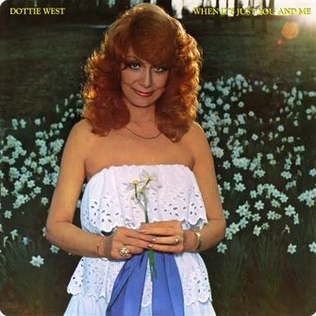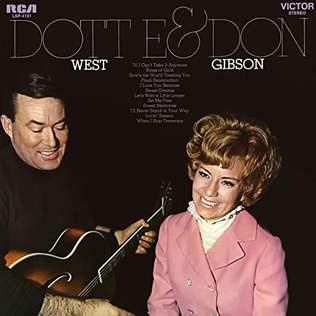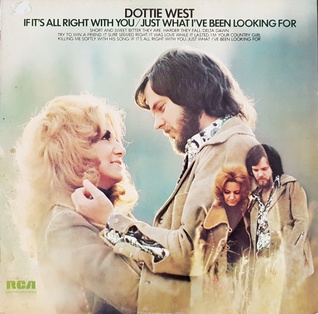Related Research Articles

"Help Me Make It Through The Night" is a country music ballad written and composed by Kris Kristofferson and released on his 1970 album Kristofferson. It was covered later in 1970 by Sammi Smith, on the album Help Me Make It Through the Night.
"Country Sunshine" is a song co-written and recorded by American country music artist Dottie West, remembered both as one of West's biggest chart hits, and also as the jingle from a classic Coca-Cola television ad: co-written by West with Billy Davis and Dianne Whiles, "Country Sunshine" was released September 1973 as the first single from West's Country Sunshine album.
"A Lesson in Leavin'", also titled as "Lesson in Leavin"', is a song written by Randy Goodrum and Brent Maher. It was originally recorded in 1979 by American country music singer, Dottie West, for her Special Delivery album.
"Here Comes My Baby" is a song co-written and recorded by American country music artist Dottie West. It was released in June 1964 as the first single and title track from the album Here Comes My Baby. West wrote the song with her then-husband Bill.

"What Are We Doin' in Love" is a song written by Randy Goodrum and recorded by American country music artist Dottie West. Although not credited on the single release, the song also features American country and pop recording artist Kenny Rogers. It was released in March 1981 as the second single from the album Wild West. The song was West and Rogers' third and final number one on the country chart.

"Last Time I Saw Him" is a 1973 song by Diana Ross, being a composition by Michael Masser and lyricist Pam Sawyer. The track was produced by Masser and released as the first single on December 6, 1973, from her album of the same name.

Country Sunshine is a studio album by American country music artist Dottie West. It was released in November 1973 on RCA Victor Records. The album's ten tracks were produced by Billy Davis. Her 21st studio recording, Country Sunshine was released following the success of the title track. The song became a major hit after first being part of a Coca-Cola commercial. The album itself would reach major positions on national publication charts following its release.

When It's Just You and Me is a studio album by American country artist Dottie West. It was released in July 1977 via United Artists Records and contained 11 tracks. It was the 24th studio album in West's career and her first for the United Artists label. Of its 11 songs, four of them were spawned as singles: the title track, "Every Word I Write", "Tonight You Belong to Me" and "That's All I Wanted to Know". The title track reached the top 20 on the US and Canadian country singles charts. The album was reviewed positively by Billboard magazine following its original release.

Country Girl is a studio album by American country music artist Dottie West. It was released in August 1968 on RCA Victor Records and was produced by Chet Atkins. The project was West's ninth studio album and second to be released in 1968. The album consisted of 12 tracks, which contained new recordings and cover versions. The album's title track became a major hit in 1968 and would later be a signature song for West.

Dottie and Don is a studio album by American country music artists Don Gibson and Dottie West. It was released in March 1969 on RCA Victor Records and was produced by Chet Atkins and Danny Davis. The album was a collection of duet recordings between Gibson and West. It was both artists first album of duets to be recorded. Among the songs from the project, "Rings of Gold" became a major hit in 1969.
"Till I Can't Take It Anymore" is a song written by Clyde Otis and Ulysses Burton. It was first recorded by Ben E King in 1968. The song was featured in The Soul Clan's self-titled album The Soul Clan. Dottie West and Don Gibson's version charted at 46 on the Hot Country Songs in 1970. Since then, it has also charted as a single by Andra Willis, whose version went to number 85 on the same chart in 1973. Pal Rakes's version went to number 31 in 1977.

"Sweet Music Man" is a song written and recorded by American musician Kenny Rogers. It appears on his 1977 album Daytime Friends, from which it was released as the final single.
"Rings of Gold" is a song recorded by American country music artists Dottie West and Don Gibson. It was released in February 1969 as the first single from their album Dottie and Don. The song peaked at number 2 on the Billboard Hot Country Singles chart. It also reached number 1 on the RPM Country Tracks chart in Canada.

If It's All Right with You/Just What I've Been Looking For is a studio album by American country music artist Dottie West. It was released in May 1973 on RCA Victor Records and was produced by Jerry Bradley. The project was West's 20th studio recording in her music career. It consisted of ten tracks, two of which became minor hits on the country charts in 1973. The album's contemporary sound helped modernize West's music, bringing the album to chart on the Billboard country albums survey in 1973.

The singles discography of American country artist Dottie West contains 59 singles released as a solo artist, 12 singles released as a collaborative artist, 3 promotional singles and 1 other charting song. West signed with RCA Victor Records in 1963, having her first Top 40 hit the same year. It was followed in 1964 by "Love Is No Excuse", a duet with Jim Reeves that became West's first top 10 hit. In 1964, she also released "Here Comes My Baby". The song reached number 10 on the Billboard Hot Country Singles chart and became the first song by a female country artist to win a Grammy award. From her 1966 album, West issued four singles, including the top 10 hits "Would You Hold It Against Me" and "What's Come Over My Baby". Over the next two years she had major hits with "Paper Mansions", "Like a Fool", "Country Girl", and "Reno". In 1969, West collaborated with Don Gibson on "Rings of Gold", which reached number 2 on the Billboard country chart. In 1973, she released a single version of a commercial jingle originally used by The Coca-Cola Company. Entitled "Country Sunshine", the song became West's biggest hit, reaching number 2 on the country songs chart and number 49 on the Billboard Hot 100. The song also nominated her for her eleventh Grammy. After releasing the top 10 hit "Last Time I Saw Him" (1974), West's chart hits declined and she was dropped from RCA in 1976.
"Reno" is a song written by Ruby Allmond, and recorded by American country music artist Dottie West. It was released August 1968 as the first single from the album The Best of Dottie West. The song peaked at number 19 on the Billboard Hot Country Singles chart. In addition, "Reno" peaked at number 6 on the Canadian RPM Country chart.
"Come See Me and Come Lonely" is a song written by Red Lane, and recorded by American country music artist Dottie West. It was released in May 1978 as the first single from the album Dottie. The song peaked at number 17 on the Billboard Hot Country Singles chart. In addition, "Come See Me and Come Lonely" peaked at number 28 on the Canadian RPM Country chart. Later in the year, the single was released onto West's 1978 album entitled Dottie. It was the only single released from the album.
"Anyone Who Isn't Me Tonight" is a song written by Julie Didier and Casey Kelly, and recorded by American country music artists Kenny Rogers and Dottie West. It was released in August 1978 as the second single from the album Every Time Two Fools Collide. The song peaked at number 2 on the Billboard Hot Country Singles chart. The song also peaked at number 10 on the RPM Country Tracks chart that year.
"(I'm Gonna) Put You Back on the Rack" is a song written by Randy Goodrum and Brent Maher, and recorded by American country music artist Dottie West. The song peaked at number 16 on the Billboard Hot Country Singles chart. It was released in June 1981 as the third and final single from West's album Wild West. In addition, "(I'm Gonna) Put You Back on the Rack" peaked at number 22 on the Canadian RPM Country chart.

The albums discography of American country artist Dottie West contains 28 studio albums as a solo artist, five studio albums as a collaborative artist, 18 compilation albums and additional album appearance. Among West's studio releases were five collaborative albums with various artists, including Kenny Rogers. After signing with RCA Victor Records in 1963, West released her debut studio album Here Comes My Baby (1965). The album peaked at number 12 on the Billboard Top Country Albums chart in July 1965. West's third studio album Suffer Time (1966) spawned four singles, including "Would You Hold It Against Me", a top 5 hit on the Billboard Hot Country Songs chart. Suffer Time would reach number 3 on the country albums chart, West's highest-charting solo album. Between 1967 and 1968, West released 5 more studio albums. With All My Heart and Soul (1967) featured the top 10 hit "Paper Mansions" and the album itself peaked at number 8 on the Top Country Albums list. In 1969, she paired with Don Gibson for her first collaborative project Dottie and Don. The album featured the pair's number 2 Billboard country hit "Rings of Gold". In 1970, she collaborated with Jimmy Dean on the studio release Country Boy and Country Girl. In 1973, West had her biggest hit with the single "Country Sunshine". Its corresponding album of the same name peaked at number 17 on the country album chart in February 1974.
References
- ↑ Whitburn, Joel (2004). The Billboard Book Of Top 40 Country Hits: 1944-2006, Second edition. Record Research.
- ↑ "Search results for "Country Girl"". RPM . Archived from the original on 14 December 2013. Retrieved 15 October 2012.
- ↑ Telegraph-Herald, August 18, 1976, p.12
- ↑ "Dottie West Biography, Part II". Dottie West.net. Archived from the original on 24 June 2012. Retrieved 15 October 2012.
- ↑ "Dottie West Chart History (Hot Country Songs)". Billboard.